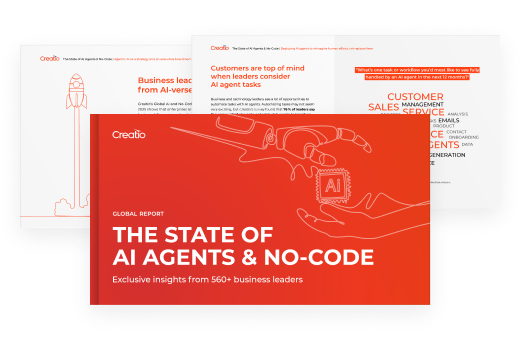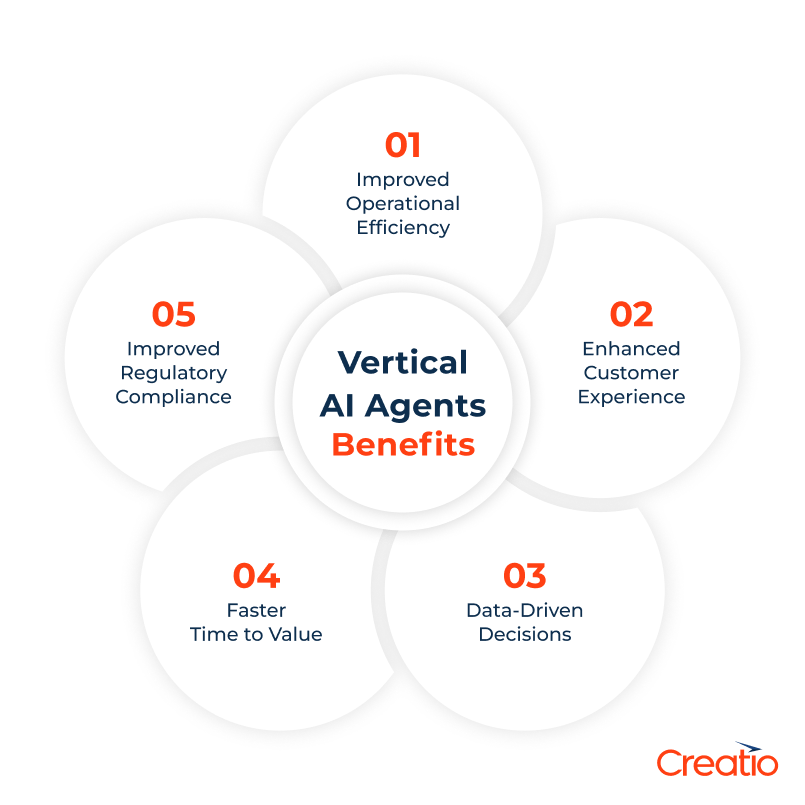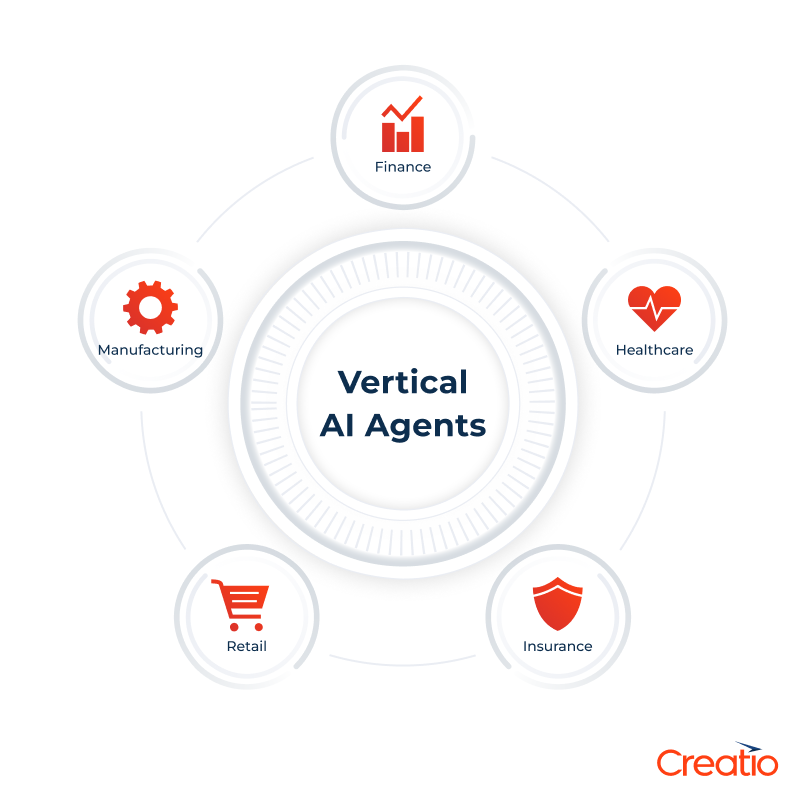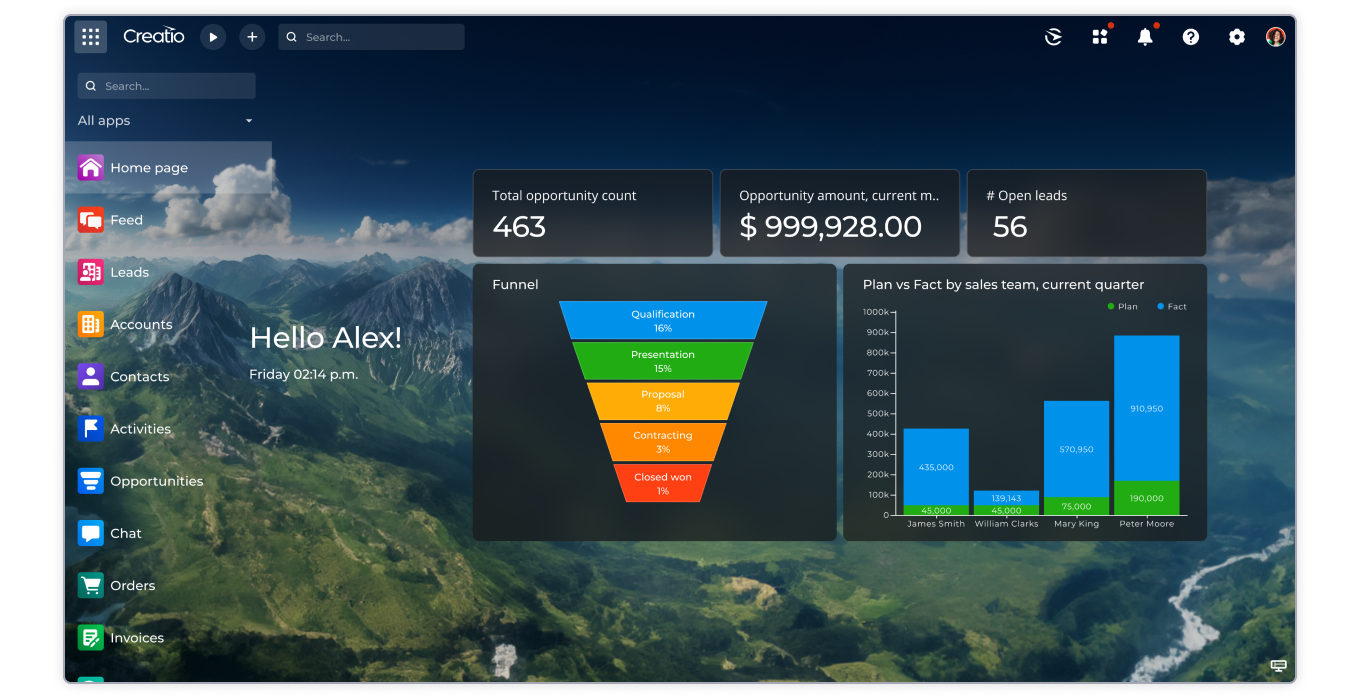-
No-Code
Platform
-
Studio
No-code agentic platform delivering the fastest time-to-value and the highest ROI
-
Studio
-
AI-Native CRM
CRM
-
AI-Native CRM
New era CRM to manage customer & operational workflows
CRM Products -
AI-Native CRM
- Industries
- Customers
- Partners
- About
What are Vertical AI Agents - The Power of Purpose-Built AI Tools
Updated on
July 17, 2025
9 min read
Accelerate Lead Response Time by 61% With Creatio

The artificial intelligence market is shifting from all-in-one, general-purpose AI solutions to more specialized AI-powered tools. With the growing need for more focused systems, AI vendors started offering purpose-built solutions designed to handle specific industries' unique challenges and opportunities.
In this article, we'll explore the rise of vertical AI agents and how they can impact business operations. We'll also present a few use cases from the finance, healthcare, manufacturing, and retail industries to showcase how AI agents can reshape the future of work.
What are Vertical AI Agents?
Vertical AI agents are specialized artificial intelligence systems designed from the ground up to perform tasks, provide insights, and solve problems within a specific industry. Unlike general-purpose AI agents, which aim to handle a wide range of functions across various sectors, vertical agents are tailor-made to automate complex workflows and processes of a particular field. This specialization enables businesses to use AI agents from day one, eliminating the need for complicated integration and customization to fit specific needs.
Vertical AI agents are trained on industry-specific data and can leverage deep industry knowledge to make more informed decisions and better support human employees in their daily tasks.
The State of AI Agents & No-Code
Learn how 560+ leaders across the world use AI and no-code to drive innovation today

The Benefits of Implementing Vertical AI Agents
Vertical AI agents focus on domain-specific challenges and offer multiple benefits that surpass the capabilities of general AI systems.
Below are some of the key benefits of vertical AI agents:

- Improving operational efficiency - vertical AI agents are designed to automate repetitive, routine, and time-consuming tasks specific to an industry. This automation helps businesses streamline operations, enhance productivity, and reduce human errors related to manual work.
- Enhancing customer experience - thanks to deep knowledge about one specific industry and its clients, vertical AI agents can offer even more personalized and context-aware services that further boost customer satisfaction.
- Supporting data-driven decisions - vertical AI agents are trained on domain-specific data and can leverage deep industry knowledge to provide data-driven insights and support informed decision-making.
- Improving regulatory compliance - In highly regulated industries such as healthcare, finance, and legal services, vertical solutions help companies comply with strict regulations. AI systems can monitor policy changes in real time to ensure enterprises are up-to-date with the newest regulations and automate compliance checks to reduce non-compliance risk.
- Faster time to value - because vertical AI solutions are purpose-built and often come pre-trained with industry knowledge, their deployment and integration into existing business systems (ERPs, CRMs, EHRs) are generally faster and less disruptive than customizing general purpose tools. This quicker implementation means businesses will see ROI quicker.
Vertical AI Agents Use Cases
Vertical AI agents can be used across various industries, such as finance, healthcare, insurance, and retail, leveraging deep domain expertise to perform specific tasks. Let's examine some everyday use cases to demonstrate the power of AI agents built with specific industries in mind.

Finance
Financial institutions can use vertical AI agents to enhance fraud detection capabilities, improve safety, and provide personalized customer experiences.
Fraud detection and prevention
Effective fraud detection is crucial in the financial industry, and vertical AI agents can revolutionize how banks and other financial institutions handle this process.
AI agents in finance can monitor and analyze transactional data in real time and around the clock, effectively identifying even the faintest signs of fraudulent activity. They can quickly detect anomalies, such as unusual spending patterns and unauthorized access, automatically block suspicious transactions, and alert analysts about potential fraud attempts.
Unlike static rule-based systems, which require humans to adjust their performance, AI agents can autonomously increase efficiency and reduce false positives by continuously analyzing feedback and similar cases.
Credit scoring and risk assessment
Traditionally, loan processing could take a lot of time, anywhere from a few days to a couple of weeks, since financial specialists had to review all the data and documents manually. Thanks to AI agents for finance, this time can be reduced to even just a few minutes.
Vertical AI agents help financial institutions assess customers' creditworthiness more accurately by quickly analyzing related data. To evaluate credit risk, an AI agent considers multiple factors, including spending habits, transaction history, and social behavior. By taking over the heavy lifting of data analysis, vertical AI agents enable banks and credit unions to make more accurate and faster lending decisions.
Personalized investment advice
AI agents for financial services companies help provide personalized investment advice at scale. A task that typically would take a lot of time and resources to deliver at scale can be automated by AI agents specifically trained to handle it and have access to expert-level knowledge.
AI agents analyze risk tolerance, market volatility, and individual client goals to provide accurate investment advice. Their objective is to offer clients personalized recommendations that optimize returns while minimizing risks.
Healthcare
Vertical AI agents are revolutionizing patient care, freeing healthcare providers from administrative burdens, enhancing diagnostic accuracy, and strengthening cybersecurity.
Medical diagnostics
The healthcare industry increasingly leverages AI to improve the effectiveness of medical diagnosis. AI agents can analyze medical images, electronic health records, test results, and patient histories to identify potential diagnoses. Because vertical AI agents are trained on vast amounts of medical data, they can quickly consult medical literature and compare similar cases to recognize illnesses in earlier stages than human doctors.
By leveraging vertical AI agents to analyze diagnostic data, medical professionals can speed up diagnosis, increase the quality of patient care, and improve patient outcomes.
Administrative tasks
Healthcare providers typically spend a considerable amount of time on administrative work. Vertical AI agents can help them reclaim this time by automating repetitive tasks, such as updating patient records, scheduling appointments, sending reminders, and filing insurance claims. While AI agents handle paperwork, healthcare professionals can spend more time tending to their patients.
Cybersecurity
Hospitals and medical clinics are just as vulnerable to cyberattacks as financial institutions. That's why they need robust security measures that help them protect sensitive patient data and adhere to strict industry regulations.
Vertical AI agents for healthcare organizations provide real-time monitoring, advanced threat detection, and automated countermeasures to ensure robust data protection. Moreover, AI agents continuously analyze historical data and global trends to update security protocols and prepare for emerging threats.
Insurance
In the insurance industry, vertical AI agents streamline claims processing, enhance underwriting accuracy, and improve customer service by automating tasks and analyzing risk factors.
Claim processing
Vertical AI agents for the insurance industry can support effective claim processing by automatically reviewing insurance claims and analyzing supporting documentation like medical records and vehicle damage photos. Based on this data, the AI agent can assess the claim's eligibility and estimate potential payouts.
By implementing an AI agent, insurance companies can automate simple claims processing, allowing human agents to focus on more complex cases that require emotional intelligence and advanced problem-solving skills. Overall, AI agents help insurance companies detect fraudulent claims more effectively and speed up settlement for genuine cases.
Risk assessment and predictive insights
AI agents for the insurance industry support proactive risk management by leveraging predictive insights. Instead of only reacting to threats, an AI agent can assess risk more accurately, based on the analysis of customer data, environmental conditions, and market trends, and alert about potential issues before they escalate.
By gaining access to predictive insights, insurance companies can reduce exposure to risks and improve long-term profitability.
Chatbots for customer support
AI-powered chatbots help insurance companies deliver faster, more personalized services at scale. They offer instant support to customers, answering typical questions, assisting with policy renewals, providing coverage details, and helping file claims. These AI-driven chatbots improve customer satisfaction by offering 24/7 support and reducing wait times.
Manufacturing
Manufacturing companies can use AI agents built to support their industry to predict maintenance needs, improve product quality, and optimize supply chains.
Predictive maintenance
Equipment outages can cost manufacturing companies money and their reputation as reliable partners. Thanks to vertical AI agents, manufacturers can reduce downtime and improve equipment longevity.
AI agents for the manufacturing industry can monitor equipment performance in real time by analyzing sensor data and comparing it to standard measurements. Based on this analysis, AI can identify patterns that may indicate potential failure or maintenance needs and schedule maintenance before a breakdown occurs.
Supply chain optimization
Manufacturers work with multiple partners and must stay agile to respond actively to potential supply chain disruptions. AI agents can support these efforts by monitoring supply chains, predicting demand fluctuations, and optimizing supply chain operations in real time.
AI agents can also autonomously manage inventory levels, using historical data and market trends to maintain the right stock levels and ensure production runs smoothly.
Quality control and defect detection
Manufacturing companies can also implement an AI agent to monitor production lines and improve product quality control. Since vertical AI agents for the manufacturing industry are designed to handle this type of task, they can analyze images and sensor data, without additional training, to efficiently detect product defects or irregularities.
Tasking an AI agent with defect detection helps ensure only high-quality products are shipped to customers, improving customer satisfaction and strengthening brand reputation.
Retail
In the retail industry, vertical AI agents enhance customer shopping experiences, optimize inventory management, and increase the effectiveness of marketing campaigns.
Personalized shopping experiences
Nowadays, customers not only favor but also expect personalized experiences. Businesses that don't adjust to these expectations can see their clients leave for the competition. However, not long ago, offering customized shopping experiences to each customer was virtually impossible, especially for larger retailers with a sizable customer base.
Vertical AI agents help improve customer shopping experiences by offering more personalized product recommendations. They analyze individual customer data, including browsing history, purchase behavior, historic purchases, and preferences, to suggest only highly relevant products. By delivering tailored suggestions in real time, retailers can improve customer satisfaction and increase the average order value.
Inventory management and demand forecasting
Retailers often face the challenge of balancing optimal stock levels with the need to minimize high warehousing costs. Thanks to advanced demand forecasting capabilities, AI agents for the retail industry can help eliminate these struggles.
AI agents can predict future product demand by analyzing seasonality, market trends, past sales, and consumer behavior. Previously, retailers had to trust their intuition or less accurate tools to forecast demand with varying results. With specialized AI agents tailored to retail needs, they can adjust stock levels more accurately, reducing costly overstocking and stockouts.
Marketing campaign optimization
Retail businesses can use AI agents to support their marketing efforts. AI agents can effectively segment the retail shop's customer base, generate marketing materials tailored to each segment, and automatically send them to customers at the right time, through the proper channels.
Additionally, AI agents for retail can carry out A/B tests to find the most effective variation of ad text, social media visuals, email titles, etc., and autonomously adjust them in real time. By leveraging AI agents, retailers can improve customer engagement and boost ROI, without significantly increasing marketing resources.
Creatio’s Vertical AI Agents
Creatio is a global vendor of an agentic CRM and workflow platform with no-code and AI at its core. It empowers businesses to deliver faster and more personalized experiences through human-AI collaboration and no-code innovation.

Businesses across various industries can leverage powerful AI agents to automate routine tasks, gain actionable insights, and make data-driven decisions. These intelligent agents work consistently across multiple channels, including web, mobile, and productivity tools, supporting humans in their daily tasks rather than replacing them. Users can collaborate with role-based AI agents tailored to the needs of sales, marketing, and customer service teams to increase operational efficiency and drive unprecedented results.
Creatio offers a purpose-built AI agent to support banks, credit unions, and other financial institutions. The Financial service agent provides powerful agentic AI capabilities, AI-native automation, and ready-to-use financial workflows to help institutions enhance operational efficiency, deliver excellent customer service, and accelerate innovation. The AI agent for financial institutions is directly embedded into industry-specific workflows, such as client onboarding and account opening, loan origination and credit scoring, compliance and risk management, and many more. Unlike generic AI tools, Creatio’s vertical AI agents are pre-trained on industry workflows, fully integrated into CRM and operations, and require no technical customization to deliver immediate results. Built from the ground up for financial services, this vertical AI agent enables institutions to launch and scale faster, eliminating the need for additional customization, integration, or licensing.






















































